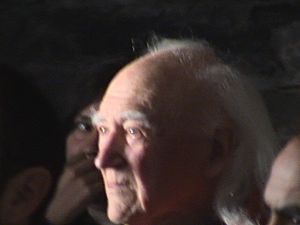René Vautier facts for kids
Quick facts for kids
René Vautier
|
|
|---|---|

René Vautier (2005)
|
|
| Born | 15 January 1928 Camaret-sur-Mer, France
|
| Died | 4 January 2015 (aged 86) Cancale, France
|
| Occupation | Film director |
| Known for | Afrique 50 |
René Vautier (15 January 1928 – 4 January 2015) was a French film director. He made many movies that talked about important issues. These issues included fairness, human rights, and protecting the environment. His films sometimes caused trouble with French authorities. Many of his movies were banned or criticized. One film even led to him spending a year in prison.
Contents
Early Life
René Vautier was born on 15 January 1928. His hometown was Camaret-sur-Mer in France. His father worked in a factory, and his mother was a teacher. When he was 15, he joined the French Resistance during World War II. This group fought against the occupation of France. He later received special awards for his brave actions. After the war, he studied filmmaking. He graduated in 1948 from a film school.
Career
Making Afrique 50
René Vautier made his first film, Afrique 50, in 1950. He was only 21 years old at the time. He was supposed to make an educational film in French West Africa. But he was shocked by the difficult conditions he saw there. He saw a lack of doctors and unfair actions by the French Army.
The film he made showed these problems. Police tried to take his film away. But Vautier managed to save some of the footage. He released the 17-minute film in 1950. People called it the first French film to speak out against colonialism. Because of this film, he faced legal trouble many times. He was even sentenced to a year in prison. The documentary was banned for 40 years.
Later Films and Activism
Vautier continued to make many important films. In 1973, he worked on Humain, trop humain. This film showed the working conditions in a car factory. He also directed Peuple en marche in 1963. This movie told the story of the Algerian War. Another film about the Algerian War was Avoir 20 ans dans les Aurès (1972). It won an award at the 1972 Cannes Film Festival.
René Vautier made over 180 films in his career. Some of his films were destroyed by the French government. Several of his movies were shown at the Cannes Film Festival. In 1973, he went on a hunger strike. He did this to protest against film censorship. He believed in freedom of expression. He received a special award in 2000. René Vautier passed away on 4 January 2015. He died at a hospital in Cancale, France.
Film Themes
René Vautier's films often focused on important social issues.
Fairness in Work
- Un Homme est Mort: This film was about a worker's death during strikes in France.
- Humain, trop humain (1973): This film looked at conditions in a car factory.
Countries Becoming Independent
- Une nation, l'Algérie (1954): This movie told the story of Algeria's history with France.
- Afrique 50 (1956): This was his first film to be released. It was the first French film against colonialism.
- Un Peuple en marche (1963): This film showed Algeria's journey from war to rebuilding.
- Avoir 20 ans dans les Aurès (1972): This movie won an award at the Cannes festival.
Fighting Unfair Treatment
- Les trois cousins (1970): This drama showed the lives of three Algerian cousins looking for jobs in France. It won an award for best human rights movie.
- Vous avez dit : français ? (1986): This film explored what it means to be French. It also looked at the history of immigration in France.
Against Unfair Segregation
- Frontline (1976): This film was made with the National African Congress. It spoke out against Apartheid in South Africa.
Protecting Our Planet
- Marée noire, colère rouge (1978): This film was about oil spills. It won an award for best documentary.
- Mission pacifique (1988): This documentary featured people who witnessed atomic explosions. It also covered the sinking of the Greenpeace boat Rainbow Warrior.
Standing Up to Harmful Political Ideas
- À propos de… l'autre détail (1984): This documentary was about people who were tortured during the Algerian War.
Women's Rights
- Quand les femmes ont pris la colère (1977): This film was made with Soazig Chappedelaine. It focused on women's anger and rights.
Films About His Home Region
- Mourir pour des images (1971)
- La Folle de Toujane (1974): This was a fiction film made with Nicole Le Garrec.
See also
 In Spanish: René Vautier para niños
In Spanish: René Vautier para niños
 | William M. Jackson |
 | Juan E. Gilbert |
 | Neil deGrasse Tyson |

